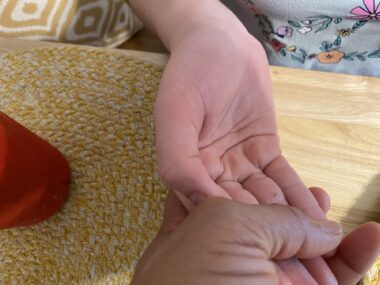Learning to work smarter when your Angel is bigger than you
As her daughter grows, a mother finds new, and safe, methods of caregiving
Written by |

I’m facing a truth that I knew was coming: My 13-year-old Angel, Juliana, is bigger than me. Once hormones took over, the growth spurt wasn’t far behind.
But when your child has a neurogenetic disorder like Angelman syndrome, which poses specific challenges, growth means more than a taller kiddo. It means daily care must be more intentional to keep you and your daughter safe and healthy.
In my case, Juliana’s weight, height, and strength all come into play as she grows.
As she gets older, transitions from one place to another become more and more important, and we have to be careful how we help her move about. Juliana isn’t bigger than my husband, but she does weigh 100 pounds, so lifting her is out of the question. I stopped attempting to lift Juliana when she hit 30 pounds; my husband got the memo late and tried to lift her until he hurt his back. Support, not lifting, is what works. Our first challenge came when she was too heavy to put in the car.
Helping smarter
Of course, Juliana can now raise and seat herself into my SUV. But when she couldn’t do that, I’d use my full body to support her weight against me to hoist her inside. The fact that she isn’t overweight helps, though. Obesity isn’t a problem for Juliana, but it’s common for adult Angels. As she grows, her weight is something we continue to monitor, and keeping her active helps.
Height matters now, too. Seeing eye to eye with her takes on new meaning when it comes to daily hygiene, for instance. Technically, Juliana has 2 more inches to grow before she matches my 5-foot-1 frame, but that won’t take long. Sitting her below me to comb her hair or brush her teeth is my new method of care.

Juliana, right, gets a hug from her mom as they view her artwork at a recent show. The two are nearly the same height. (Courtesy of Sabrina L. Johnson)
When I manage tasks like hair care, Juliana now sits next to me or in a chair below me so that I’m the taller one. Even something as simple as removing a splinter takes thought. The other day, for instance, I noticed Juliana’s finger had a splinter. “Oh, no!” came to mind.
I told my husband and my other daughter, Jessa, about the problem. Their reactions were similar to mine. Jessa even wished me luck as I went off to perform the task.
Why all of the angst? Well, keeping Juliana still long enough for that little bit of surgery would be challenging. With her hyperactivity in full swing, she’s often ready to move on to something else. But the other concern was about performing the job quickly and carefully to keep her from getting upset.
Everything is better with food
For someone who struggles with balance, Juliana is quite strong. Her slaps and scratches pack a mean punch when she’s upset. Sometimes, she’ll grab me in a way that really hurts, but I’ll try to redirect her without emotion. If I show too much emotion, it triggers her anxiety and unleashes a bout of screams.
For those reasons, I decided to delay the splinter removal till I knew she would be happier — after eating. Then, armed with my supplies, I sat next to her and went to work.

Sabrina gently holds Juliana’s hand as she prepares to remove a splinter from her finger. (Courtesy of Sabrina L. Johnson)
Surprisingly, she was cooperative. There were only a few times when we had a tug of war, and then she pushed my hand away with quite a bit of force. I used some of my techniques to calm her anxiety. Before we knew it, the splinter was out.
When our children are little, it’s hard to imagine them growing up. My Angel growing bigger than me has changed a few things, but it’s not making my life too difficult, at least so far. If nothing else, it keeps my mind fresh with ideas on better ways to accomplish tasks.
As the parent of an Angel, there will always be change. Accepting that is the first step in making the new circumstance easier to manage.
Note: Angelman Syndrome News is strictly a news and information website about the disease. It does not provide medical advice, diagnosis, or treatment. This content is not intended to be a substitute for professional medical advice, diagnosis, or treatment. Always seek the advice of your physician or other qualified health provider with any questions you may have regarding a medical condition. Never disregard professional medical advice or delay in seeking it because of something you have read on this website. The opinions expressed in this column are not those of Angelman Syndrome News or its parent company, Bionews, and are intended to spark discussion about issues pertaining to Angelman syndrome.







Leave a comment
Fill in the required fields to post. Your email address will not be published.